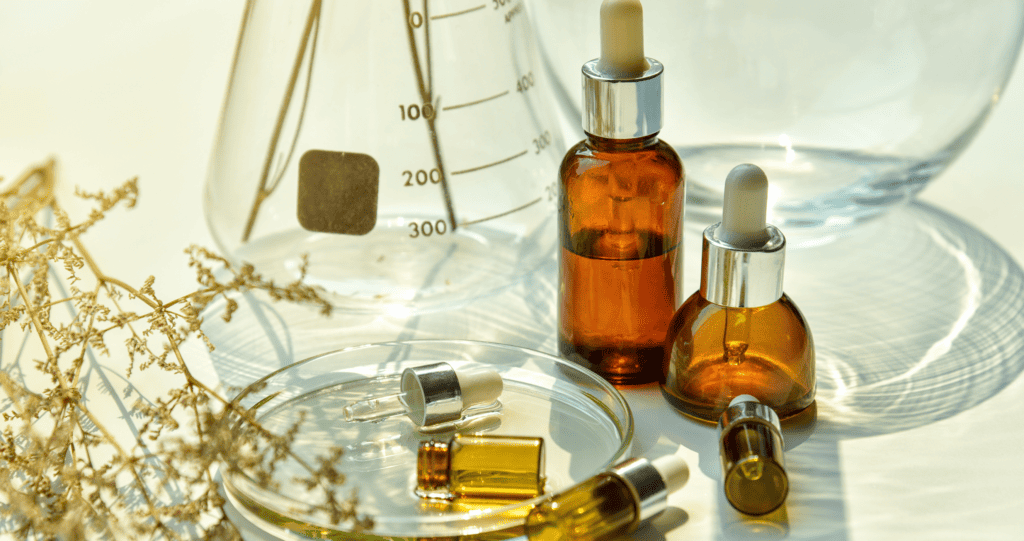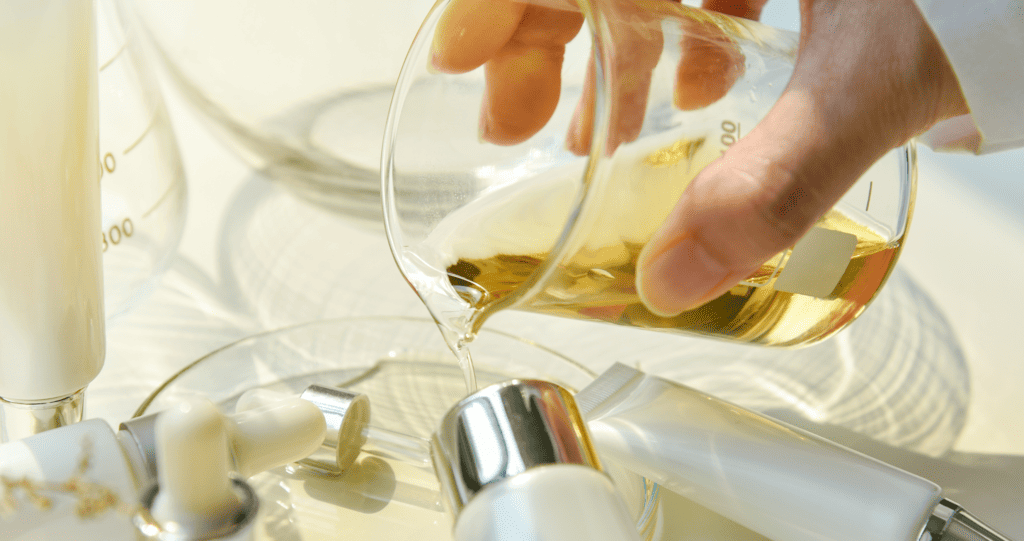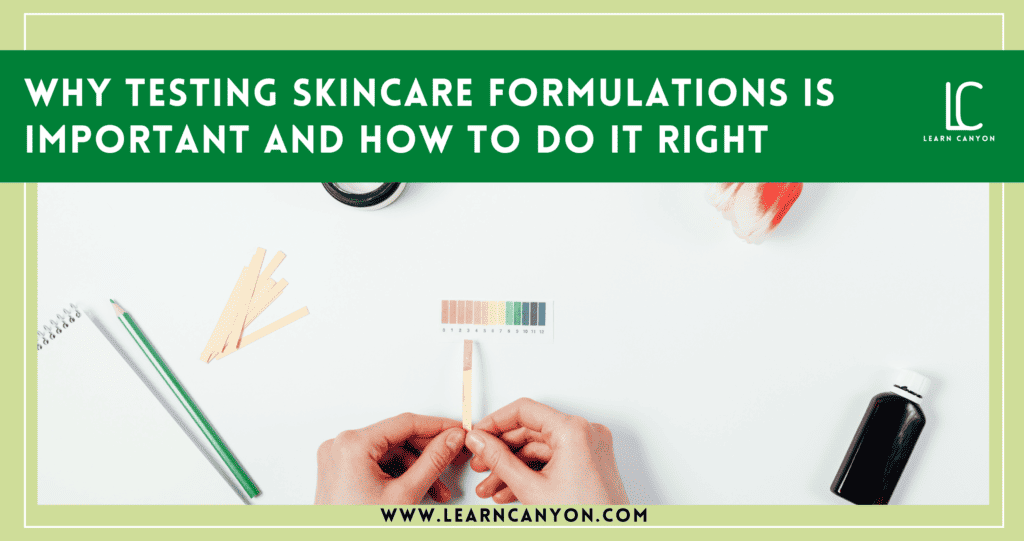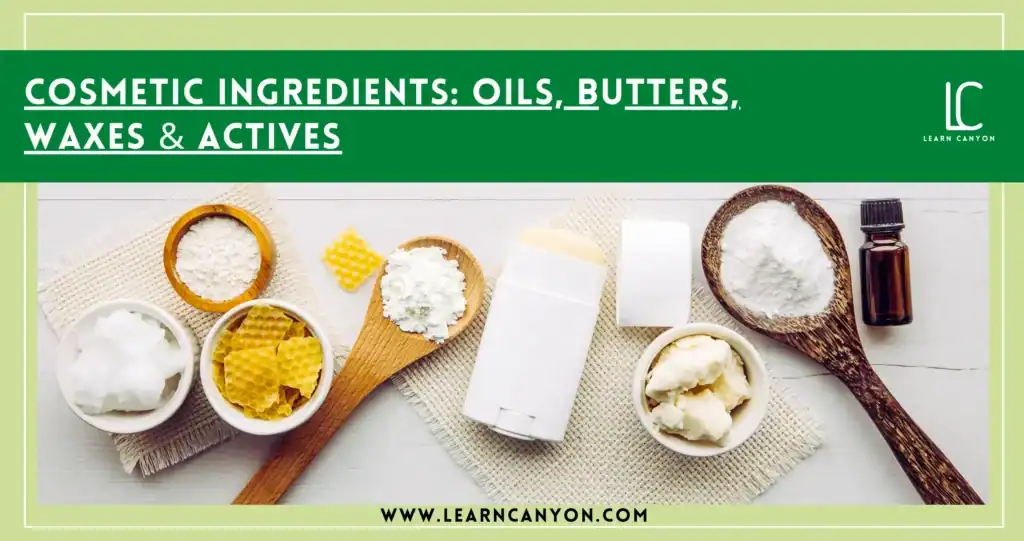If you had an option between a product that sold itself as “organic” and one that promoted itself as “synthetic,” which would you choose?
Concerns about the short and long-term safety of what we put in and on our bodies, combined with concerns about the well-being of our planet, have resulted in a rising percentage of customers preferring organic over synthetic.
But what exactly do such terms mean, and is one consistently superior to the other? – Organic Vs Synthetic Ingredients
You might be amazed to learn that organic isn’t necessarily better, and synthetic isn’t always harmful.
When ingredients are classified as “synthetic” or “organic,” it is usually because of their origin. Synthetic ingredients come from various sources, such as petroleum and petrochemicals. On the other hand, organic ingredients are processed using natural methods, such as fermentation or distillation.
Both organic and synthetic ingredients can be beneficial when it comes to skincare formulas. While there are some differences, the primary factor determining a product’s effectiveness is its formulation. Basically, the ingredients within a product should work together to provide optimal results for your skin.
When determining which ingredient to use in your skincare formula, think about what will work best for your skin’s unique needs. Both organic and synthetic ingredients have their benefits, so choose whichever option suits you best!
Knowing The Product Before Buying
When purchasing a product, you want to guarantee that it is both safe and healthful.
We all know how organic skincare ingredients may have healthy benefits, whereas synthetic ingredients in cosmetics if used for a longer period can sit on the skin’s cellular level causing skin problems such as irritation, clogging and many more infectious effects.
But the unfortunate reality is that many skincare products claim to be natural and organic when they are not…part of the so-called “GREENWASHING” problem you may have heard of.
So, how can you know whether a skincare product is ORGANIC or SYNTHETIC? Let’s take a look at them one by one and learn more about them.

What Are Organic Ingredients In Skincare?
Organic ingredients are those that are produced without the use of pesticides, chemical fertilisers, or any other synthetic substance. Some of the organic ingredients include plant extracts, plant oils or butter, essential oils and resins.
Organic is the most strictly controlled of all labels. In order to be labelled organic, a cosmetic item must be made with at least 95% synthetic-free ingredients. The FDA strictly regulates the term “organic” use under the Federal Food, Drug, and Cosmetic Act and the Fair Packaging and Labelling Act.
Some manufacturers use the phrase “made with organic ingredients,” which signifies that the product contains some organic components but does not satisfy the 95% level that qualifies it as truly “organic.”
As a result, authentic “organic” skincare contains natural and organically manufactured elements. Organic skincare products from a reputable company may nourish and hydrate the skin, making it radiant and dewy.
When shopping for skincare, look for a list of components and if it is labelled organic or certified organic.
So, for further clarity, let’s first see the benefits of organic ingredients in skincare formulation.
Benefits Of Organic Ingredients In Skincare
Some of the pros of organic ingredients in skincare formulation are explained below.
- They are Non-Allergenic
Organic skincare products are less prone to produce allergic reactions, inflammations, or irritations because they are free of harsh chemicals. If an allergic response occurs when using organic products, it is most likely attributable to a biological element (such as peanuts or strawberries), which is more easily identified.
- Works better on the skin than Synthetic ones
Organic plants have been proven to have higher levels of essential antioxidant vitamins compared to non-organic plants. Since those plants are produced without herbicides and pesticides, their organic ingredients are free of contaminants, which is effective for your skin and body.
Furthermore, active compounds in organic skincare formulation can account for up to 95% of the components.
On the other hand, active ingredients make up only 5 to 10% of synthetic skincare products.
- Supports cruelty-free cosmetics
The cosmetics industry has faced criticism for using animals to test their products to verify that they are safe for human use. Organic products do not require this because they contain natural substances that are both safe and harmless!
When you purchase organic skincare, you are purchasing cruelty-free skincare and also supporting the industry’s move to eliminate animal testing.
- Helps preserve the environment
Organic skincare products leave no adverse impact on our planet since they are made from naturally grown components that are devoid of poisonous pesticides and fertilisers.
Organic farming is also better for wildlife, generates less pollution from pesticide and fertiliser sprays, emits less carbon dioxide, and generates fewer hazardous wastes.
By purchasing organic cosmetics, you are reducing your environmental impact and promoting the long-term viability of the ecosystem.
Example Of Organic Ingredients Commonly Used in Skincare Formulation
Here are some of the most effective organic ingredients commonly used in skincare formulation.
1. Aloe Vera
It contains active ingredients such as Vitamin B1, B2, B6, C, amino acids and salicylic acids. Has anti-inflammatory properties.
Learn More About Aloe Vera Extract
2. Argan Oil
Contains active ingredients such as antioxidants, vitamin E and anti-inflammatory ingredients that cure skin issues like atopic dermatitis.
3. Avocado
Ingredients include essential nutrients and phytochemicals such as; Vitamin A, B1, B12, B2, D, E, lipids and fatty alcohol. Cures skin issues like psoriasis, and vulvar lichen sclerosis and reduces redness from acne.
4. Licorice Root
Contains glabridin, an active compound with skin-lightening properties and helps in hyper-pigmentation. Has anti-inflammatory ingredients and antimicrobial properties.
5. Hyaluronic Acid
This organic ingredient acts as a humectant to the skin and is found in potatoes, soy-based food, and vegetables. Source of antioxidants to skin.
6. Rosemary Extract
Contains active ingredients such as carnosic acid, carnosol, ursolic acid and rosmarinic acid. They have flavonoids as well which helps in numerous skin issues.
Learn More About Rosemary Extract

What Are Synthetic Ingredients In Skincare?
Synthetic or chemical ingredients are those that contain scientifically generated or modified substances created by the use of synthetic mixtures of natural ingredients.
Many dangerous chemical elements that cause long-term skin irritation can be found in standard synthetic skincare products.
A typical chemical skincare product may contain 15 to 50 chemical components or mixtures. According to studies, the average woman utilises 9 to 15 personal care products every day. So, on a daily basis, a woman can apply between 500 and 515 different chemicals to her skin.
Each chemical cosmetic has a carefully crafted blend of key components such as,
- Emulsifiers
- Preservatives
- water
- Thickeners
- Glitters
- Artificial colouring agents
- Emollients
- Artificial fragrances
- Parabens
Synthetic compounds are sometimes designed to resemble natural ones.
For instance, research on using synthetic ingredients in skincare says that salicylates are molecules extracted from willow bark that have been utilised for centuries to alleviate fever and inflammation, but it wasn’t until salicylate derivatives were synthesised in a laboratory that they were able to be produced in mass quantities cheaply, leading to the drug we now know as aspirin.
Aspirin is safer than Willow Bark tea, for illustration.
Similarly, Vitamin C is a single instance of a naturally occurring ingredient that has been successfully recreated in the laboratory. Some synthetic compounds can help stabilise vitamin C and boost its efficiency, allowing it to be used safely in higher quantities.
So, are we sure all synthetics are bad? The answer is not always.
However, you should still be cautious about what’s within your chosen product. This is why it is critical to read the label for your health.
For further clarity, let’s see the benefits of Synthetic ingredients in skincare formulation.
Benefits Of Synthetic Ingredients In Skincare
To be honest, there aren’t many benefits of using synthetic ingredients in any skincare formulation as most of them are obviously chemical-based and have no advantages to skin health, except very few lab-produced synthetics that can act as a good emollient or preservatives that can be beneficial when applied.
Some benefits are as follows;
1. Has Improved Batch Consistency
While many natural compounds can be used directly from the source, synthetic ingredients are created by experts in a professional lab, providing significantly greater consistency and uniformity in batch quality.
2. Creates Kinder Options
Lab-extracted components in synthetic skincare products can allow us to choose more sustainable, cruelty-free options.
Squalene, for example, is a moisturising component generally derived from shark livers–a prime example of not-so-great natural skincare.
Squalane, on the other hand, is derived in a lab from rice bran, sugarcane, and olives.
3. Safely Lab-created Emollients and Thickeners
While synthetic cosmetics can contain hazardous substances, there are some ingredients that we as a cruelty-free community appreciate.
Glycereth-26, for example, is a water-binding emollient and thickening that makes goods feel smooth and rich, and it has no known negative effects.
Another example is hydrogenated polydecene, which has been shown in clinical testing to improve the spreadability and even application of skincare products while also smoothing the skin.
Examples of synthetic ingredients commonly used in skincare formulation
Most of the synthetic ingredients used in certain skincare formulas have adverse effects rather than positive effects on the skin.
Here is the list of synthetic ingredients you must be aware of before buying any skincare item, as these components are smoothly mixed in a formulation using advanced techniques that you can not even identify.
1. Petroleum Jelly
A mineral oil jelly that leaches vitamins and minerals from your body, increases sun damage and aids in the treatment of dry, chapped skin.
Petroleum jelly is a byproduct of the manufacturing of petrol. Do you really want that on your skin?
2. SLS
With a long list of allergic responses such as eye irritation, skin rashes, hair loss, and flaky scalp, it’s surprising that this terrible ingredient is still commonly used in items from laundry soap to shampoo, bubble bath, and just almost every single item on the market.
3. Propylene Glycol
This mineral oil is used in cosmetics as well as automated braking hydraulic fluid and industrial antifreeze. Isn’t that enough to damage your skin?
4. Stearalkonium Chloride
A hazardous substance that has been linked to allergy reactions in the past.
5. Synthetic colours and fragrances
Synthetic colours are cancer-causing chemicals, according to popular belief.
And, Synthetic fragrances include perfume, Fragrance, fragrance oil, and perfume. These are common phrases for a chemical compound that can have up to 200 unidentified constituents.
Common adverse effects include headaches, dizziness, rash, hyperpigmentation, severe coughing, vomiting, and skin irritation.
6. Diethanolamine (DEA)
It has been shown to be harmful to the immune system, to be an allergen to the skin, and to produce carcinogenic nitrosamines.
7. PVP/VA Copolymer
These are the micro-plastics which are polymeric particles discovered in the lung tissue of persons with lung diseases.
8. Methyl Paraben, Propyl Paraben, and Butyl Paraben
Toxic substances that have been linked to allergic responses, rosacea, and skin rashes. The presence of parabens has been found in breast cancer tissue.
Read the article on Synthetic Cosmetic & Skincare Ingredients to Avoid

Ground Reality Of Organic vs Synthetic Ingredients In Cosmetics
As previously stated, organic products can be dangerous at times, while synthetic components can be safer and more effective- how do you choose? Because of the seeming contradiction between organic and man-made beauty, people frequently fall into one of two categories.
Is it necessary to be concerned about the chemicals found in high-tech ingredients? Is organic beauty a hyped-up craze with insufficient evidence to back it up? Perhaps it’s the notion that you have to pick between the two that’s out of date.
Organic does not imply vegan or vegetarian. Organic skincare products are manufactured from bovine and fish collagen, snail slime, shark liver oil, and crushed beetles.
All organic does not always imply 100% natural. Because there are minimal standards governing cosmetic product labelling, an “organic” product may have a majority of natural ingredients yet may contain unfavourable synthetic ones.
There is a common misperception that by eliminating something UNNATURAL (chemical), you are replacing it with a safer and more effective option. That is not always the case, however. Do you prefer organic in the sense that you do not want anything harmful? Please, yes!
Do you want organic in the sense that it is safe but not particularly beneficial? No, no, no! That is why, at Learn Canyon, we employ great organic components whenever possible, but if they make our product less effective, we will find a synthetic-safe replacement. We offer skincare formulation courses where we use highly advanced formulation techniques to train formulators to have the correct knowledge of balancing the use of both synthetic and organic ingredients to improve a skincare product’s efficacy based on various skin conditions and beauty standards.
This specific certification course shows that our entire brand is fully committed to organic ingredients and environmentally friendly practices. It also implies that our skincare products comply with all international cosmetic standards and are free of the over 1,300 hazardous compounds that have been banned.
How To Make Informed Choice That Suits Your Needs?
As you start constructing your skincare product, you will be confronted with a bewildering variety of ingredient alternatives.
You’ll likely also learn a lot about the distinctions between synthetic and organic, as well as the subtleties between natural and organic.
Note: The term NATURAL differs from ORGANIC.
When it pertains to formulation, consider the following factors:
- Availability of components: Are the ingredients easily accessible?
- Effectiveness: Will the substances perform as expected?
- Sustainable: Can these substances be sourced in an environmentally friendly manner?
- Branding: Do the ingredients and where they are sourced match my branding and messaging?
- Cost: Can I use the components I want while still pricing my product appropriately for my target market?
Final Thoughts
Organic cosmetics are growing in popularity among enthusiasts who are eager to keep their skin healthy. However, many people are still unsure or hesitant to switch from synthetic to organic skincare products as there hasn’t been deep research conducted yet when it comes to the usage of synthetic and organic ingredients which is why the entire market feels lost in a desperate zone of using organic skincare.
Many consumers are unaware of all the benefits of using exclusively organic products or have grown confused by the many words used in the beauty business.
Unfortunately, the majority of the legwork is left to the consumer. You, indeed. Perform your homework by visiting brand websites, reading ingredient labels, and verifying any certifications. Until stronger restrictions are enforced, you must define your own guidelines for what you do and do not want on your face and put in the work.
Thus, we hope this has provided you with some IMPORTANT insights and we encourage you to enroll in our formulation courses to sharpen your formulation skills and to gain clarity about organic and synthetic ingredients.












1 thought on “Organic vs Synthetic Ingredients: Their Difference In Skincare Formulation”
I love this and learnt from it. I hope to be a successful organic skincare formulator